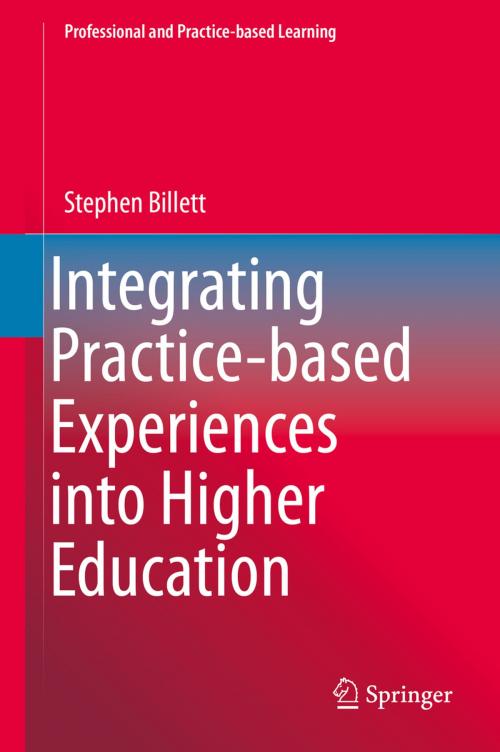Integrating Practice-based Experiences into Higher Education
Nonfiction, Reference & Language, Education & Teaching, Counseling & Guidance, Higher Education| Author: | Stephen Billett | ISBN: | 9789401772303 |
| Publisher: | Springer Netherlands | Publication: | July 15, 2015 |
| Imprint: | Springer | Language: | English |
| Author: | Stephen Billett |
| ISBN: | 9789401772303 |
| Publisher: | Springer Netherlands |
| Publication: | July 15, 2015 |
| Imprint: | Springer |
| Language: | English |
This book advances understandings about and practices for effectively integrating practice-based (e.g. workplace) experiences in higher education programs. This issue is becoming of increasing salient because higher education programs globally are increasingly focussing on preparing students for specific occupations. Such imperatives are reflected in the cooperative education movement in North America, the foundation degree programs of the United Kingdom, the work integrated learning approach within Australian higher education and initiatives in a range of other countries. There are clear and growing expectations that graduates from such should be able to move smoothly into being effective in their occupational practice. These expectations rise from the imperatives and interest of government, employers, community and students themselves. The book achieves a number of important goals. Firstly, it identifies and delineates the educational worth of students and engagement in practice-based experiences and their integration within their programs of study. Secondly, it advances conceptions of the integration of such experiences that is essential to inform how these programs might be enacted. Thirdly, drawing on the findings of two teaching fellowships, it proposed bases and propositions for how experiences in higher education programs might be organised and augmented to support effective learning. Fourthly pedagogic practices seen to be effective in maximising the learning from those practice experiences and integrating them within the curriculum are identified and discussed. Fifthly, a particular focus is given to students’ personal epistemologies and how these might be developed and directed towards supporting effective learning within practice settings and the integration of that learning in their university programs.
This book advances understandings about and practices for effectively integrating practice-based (e.g. workplace) experiences in higher education programs. This issue is becoming of increasing salient because higher education programs globally are increasingly focussing on preparing students for specific occupations. Such imperatives are reflected in the cooperative education movement in North America, the foundation degree programs of the United Kingdom, the work integrated learning approach within Australian higher education and initiatives in a range of other countries. There are clear and growing expectations that graduates from such should be able to move smoothly into being effective in their occupational practice. These expectations rise from the imperatives and interest of government, employers, community and students themselves. The book achieves a number of important goals. Firstly, it identifies and delineates the educational worth of students and engagement in practice-based experiences and their integration within their programs of study. Secondly, it advances conceptions of the integration of such experiences that is essential to inform how these programs might be enacted. Thirdly, drawing on the findings of two teaching fellowships, it proposed bases and propositions for how experiences in higher education programs might be organised and augmented to support effective learning. Fourthly pedagogic practices seen to be effective in maximising the learning from those practice experiences and integrating them within the curriculum are identified and discussed. Fifthly, a particular focus is given to students’ personal epistemologies and how these might be developed and directed towards supporting effective learning within practice settings and the integration of that learning in their university programs.















